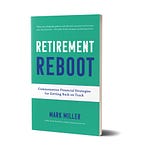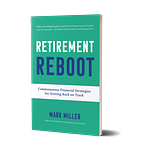
This week on the program, we’re going to attempt to untangle the annuities market. They come in an almost unbelievably complicated array of flavors and types, and their contracts can be very difficult to understand.
But before we get to that, I wanted to share a few thoughts with you about the coronavirus.
The pandemic puts everyone at risk, but older people are the most vulnerable. As a journalist covering aging, I’m mindful of that, of course. And, I’m starting to carefully reorient my coverage to do the best I can to provide useful information to readers of my stories, and people who listen to the podcast. I’m looking at this as a health story of course, but also a financial security story due to the massive impact of the crisis on the markets and most likely, the economy. The virus is starting to reshape conditions here in the U.S. and around the world that we’re barely starting to understand.
One thing I know I can do is pass along useful, authoritative information. As a journalist, I sift through hundreds of news articles, research reports, podcasts and video interviews every week. I plan to pass along the most credible, authoritative information I can find every week in the newsletter - both the subscriber and free editions. This week, scroll down a bit and you’ll find a post with links to advice for older adults from the CDC, and an interview with Dr. Anthony Fauci of NIH on the podcast of the Journal of the American Medical Association — also, an article about how the virus is impacting nursing homes.
You can also look for an article from my in this Sunday’s New York Times business section about how retirement investors can cope with their worst instincts during the current market meltdown. I’ll have a link to that story in next week’s newsletter.
So, back to annuities. Most people think of them as a way to provide guaranteed lifetime income in retirement - and you certainly can achieve that goal. But others really are more like investment products with optional income conversion features.
Annuity sales have been rising. Some of that is driven by the country’s demographics - as baby boomers reach retirement age, buyers are attracted by protection from the volatility of stocks. That last point seems especially salient considering the way the stock market has been nose-diving over the last couple weeks.
I don’t think annuities are right for everyone. Not even close to everyone. But they make sense in some situations, so this week I invited one of the most knowledgeable observers of the annuity marke that I know to join me on the podcast - Kerry Pechter.
Kerry is editor and publisher of the Retirement Income Journal, which covers the industry. He also is author of Annuities for Dummies. Like most books in the well-known Dummies series, Kerry’s book provides easy-to-grasp explanations of the various annuity types and how they work. So, if you are thinking about an annuity, get Kerry’s book.
But first, give a listen to my interview with Kerry Pechter.
Roundup of news and information on COVID-19
The risk of contracting the coronavirus and becoming ill with COVID-19 is highest for older Americans. I’ll be curating and passing along the best information I can find each week to readers of the newsletter during this crisis.
Here’s a short video overview from the Centers for Disease Control on what older adults need to know.
And here’s an interview on the spread of the virus with Dr. Anthony Fauci, head of the National Institute of Allergy and Infectious Diseases, conducted by Dr. Howard Bauchner, editor of the Journal of the American Medical Association.

Nursing homes: With the deaths of 18 residents in a nursing home in Washington state, industry leaders recommended strict limits this week on visits at facilities across the country, according to the The New York Times:
Thousands of nursing homes and assisted-living centers across the United States are becoming islands of isolation as health care administrators take unprecedented steps to lock them down, hoping to protect some of the nation’s most vulnerable residents from the threat posed by the coronavirus.
On Tuesday, industry leaders recommended curtailing all but essential visits at homes across the country, calling the challenge posed by the novel coronavirus “one of the most significant, if not the most significant” issues the industry has ever faced. Five long-term care facilities in Washington State have been hit, but officials worry the virus could already have spread to far more facilities with still-undetected cases.
“The mortality rate is shocking,” said Mark Parkinson, president and chief executive of the American Health Care Association. He said the death rate might well exceed the 15 percent that had been reported in China for people aged 80 and older.
What should you do if you or a family member are living in a nursing home or assisted living facility, or may need to go to a skilled nursing facility after a hospital stay? Howard Gleckman, an expert on long-term care, offers these thoughts in a post for Forbes.com:
There is a lot to think about, but experts have two main pieces of advice:
Don’t panic. The risk of contracting COVID-19 remains very low.
Make sure the facilities are practicing good infection control—something they should be doing all the time, regardless of the immediate news.
No doubt, residents of care facilities are at high risk for severe illness or even death if they contract COVID-19, the disease caused by the novel coronavirus. And the multiple deaths at a Kirkland, WA nursing home only raised those concerns.
To learn if a specific facility is doing it right, you can ask a few basic questions. The Centers for Disease Control has a simple factsheet for consumers called the “Top 10 Infection Prevention Questions to Ask a Nursing Home’s Leaders.”
New guide: How to time your retirement

If you’re a paid subscriber to the newsletter, you know I’ve been publishing a series of guides on key retirement topics.
The latest is a guide on timing retirement decisions. This can be a really important inflection point for your financial success in retirement, so it’s worth thinking about carefully.
The last years of work usually are peak earning years. And working even a few years more years - or less - will impact your retirement math significantly. Your timing affects the number of years that you’ll rely on savings to meet living expenses. It impacts the number of years that you can contribute to retirement saving accounts. And perhaps most important, working longer helps sets the stage for a delayed Social Security claim. That’s because it provides the income you need to meet living expenses while you wait to file.
But setting a retirement target date and sticking to it can be very difficult . . . even risky.
About one-third of workers tell pollsters they plan to work well past traditional retirement age, or not retire at all. But the data also tell us that about one-third of workers retire earlier than expected - and that the farther out you push your target date, the less likely you are to work to that date.
The most common causes for unexpected early retirement are health problems and job loss. But the study uncovered clear reasons for unplanned early retirement only in about one-quarter of cases.
Other reasons are more difficult to measure. The pull of leisure activities and time with family are factors, along with possible age discrimination. But the quality of work also matters.
The guides are downloadable, quick reads, each paired with a podcast interview on the subject at hand. My aim is to create a series of just-in-time retirement education modules - read the guide, listen to the podcast and you’re good to go. The series already includes guides on claiming Social Security, transitioning to Medicare and how to hire a financial planner.
Becoming a subscriber is easy - to sign up, click the little green button at the bottom of the newsletter page, or visit my website to learn more. The subscription price is just $5 month, and you can cancel easily at any time if you’re not happy. Once you subscribe, you’ll have access to the entire retirement guide series, including this new one on retirement timing. Plus, you’ll get links to all the articles I publish for Reuters, The New York Times, Morningstar and Wealthmanagement.com. I also publish links to the most interesting new research in the field, and links to work by other journalists that I find compelling.
Finally, you’ll be supporting independent, unbiased journalism.
Thanks for listening - and I hope to see you over on the subscriber side soon.












